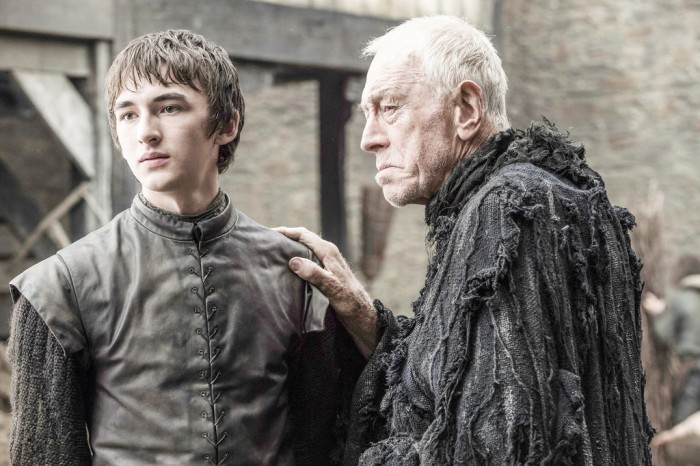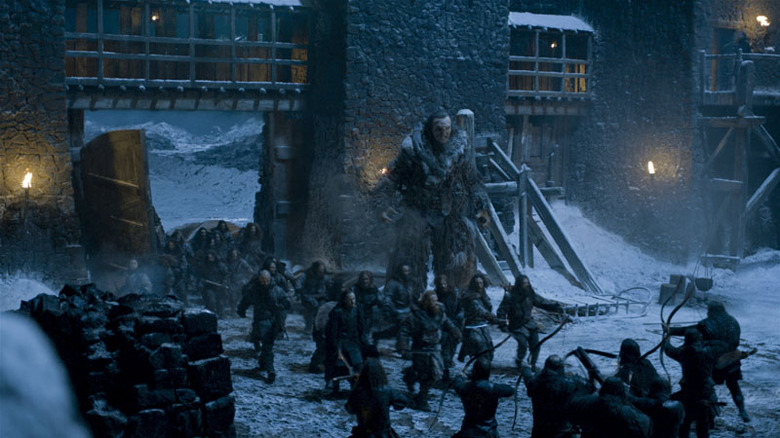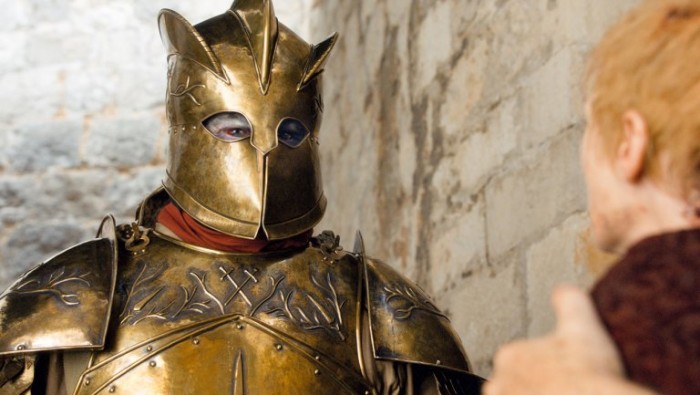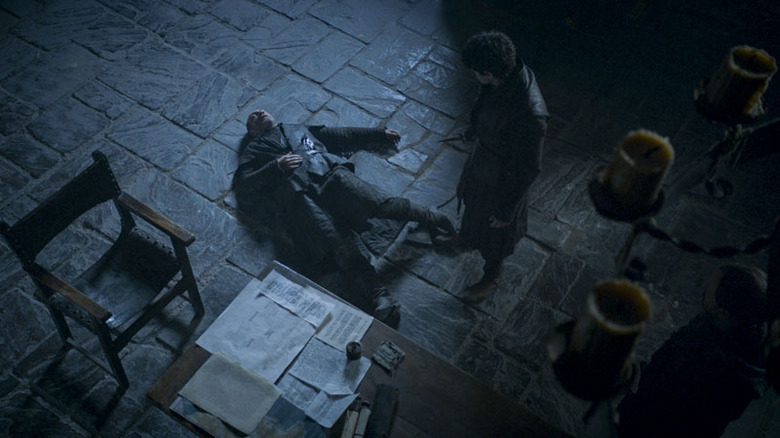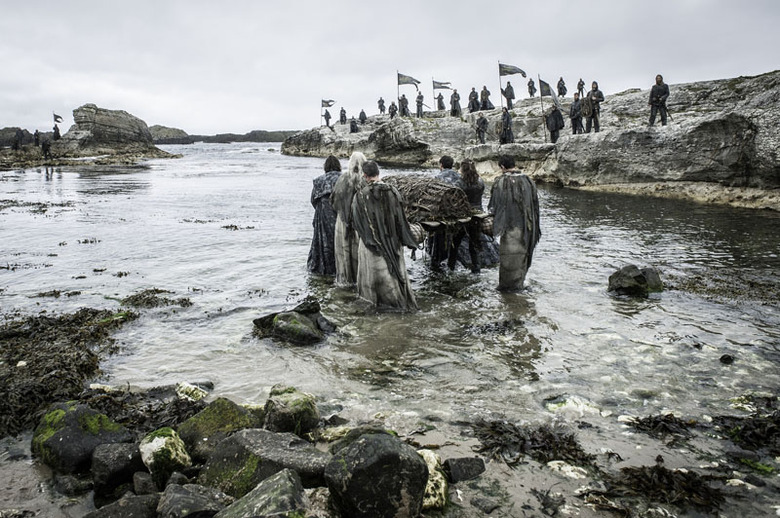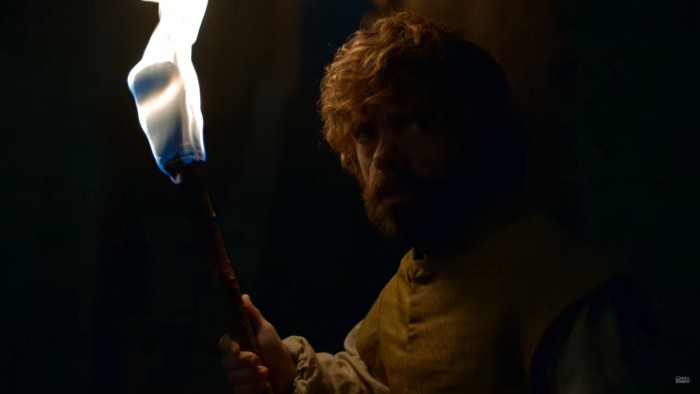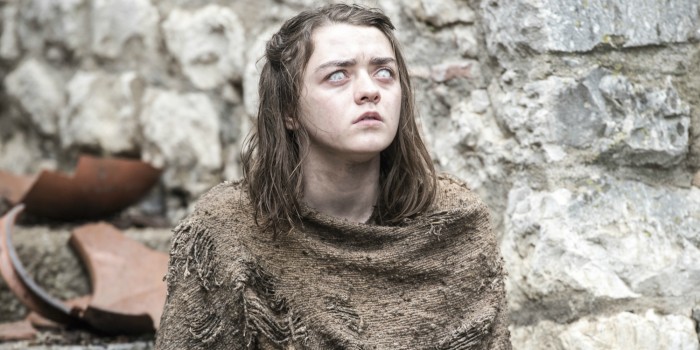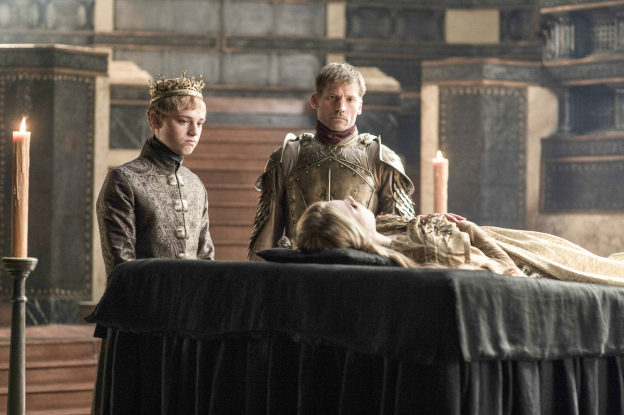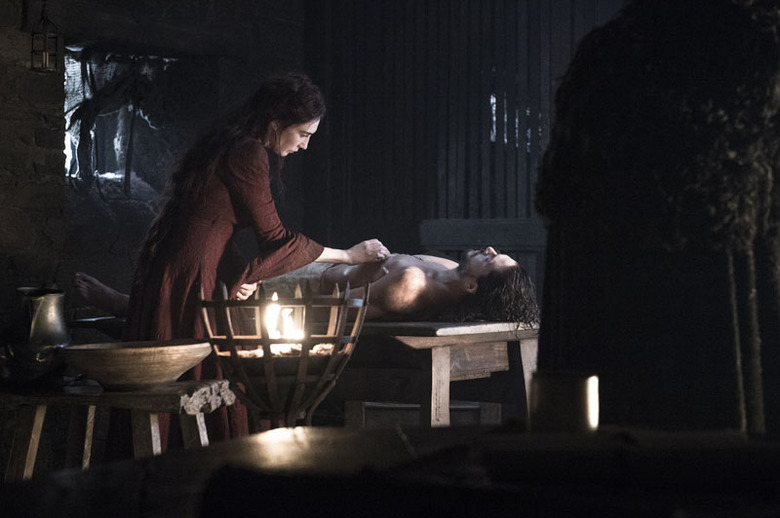'Game Of Thrones' – The 10 Most Important Moments In 'Home'
After last week's patient season premiere, Game of Thrones launched itself into action with "Home," a truly tremendous hour of television that reacted to last week's careful table-setting by overturning the table entirely. Major characters died. Power structures were radically changed. And Jon Snow...well, that would be a spoiler. Let's run down the most important stuff that happened, shall we?
Bran Visits the Past
In true Game of Thrones fashion, Bran Stark's first psychic voyage to the past was all about laying the groundwork and setting the stage for something much Bigger and More Important. That didn't minimize the pleasures of taking a peek at a much more pleasant time, though. Plus, seeing one of the Stark kids look legitimately happy for the first time in about five seasons was a nice change of pace.
Getting the chance to visit the Winterfell of a few decades ago and having the chance to spy on a young Eddard Stark and a few other long-dead characters was a wonderful moment, a respite from the bloodbath that is the rest of the "Home." Most of the scene is slice-of-life stuff: young Ned trains with young Benjen while young Rodrik Cassel, whose beard hasn't reached tying length yet and must settle for sideburns, looks on. The series even gives us our first look at Lyanna Stark, a figure who has been the subject of many conversations on the show, as her abduction by Rheagar Targaryen lights the fuse of Robert's Rebellion. We even see Hodor back before he was simple-minded, back when he was a stableboy named Wylis.
But why do we see this? Why does Bran take a journey into a pleasant flashback with the help of the Three-Eyed Raven (now played by the legendary Max Von Sydow) when there are surely bigger fish to fry and bigger memories to observe? It's simple, really – this season is going to find Bran visiting far more important moments in the history of Westeros and several definitive moments in the history of the Stark family. This sequence wasn't just about re-introducing Bran, the Three-Eyed Raven, Hodor, Leaf, and Meera. It was about cleverly re-introducing Ned and Lyanna and Benjen and other characters whose full roles in past events haven't been explored yet. If the scenes from the next episode are any indication, the pay-off to this table-setting will occur next week. Brace yourselves.
The Wildlings Take Castle Black
As the siege between the Night's Watch mutineers and the men protecting Jon Snow's dead body reached its climax, Edd arrived in the nick of time with a small army of wildlings, including Tormund and Wun-Wun the giant (who turns one member of the Watch into red paste against the side of the castle). And like that, the dynamics at at Castle Black have changed forever. The wildlings are in control of the best route to the far north, but they've acted in the interest of a "crow." Alliser Thorne, who conspired to murder Jon in the first place, has been locked up. Now, the rest of the brothers in black can only look on as their home is occupied by the "enemy" they've been fighting against for as long as anyone can remember.
We do not see the immediate aftermath of this monumental event in "Home," but the fact that it happened at all is huge. Jon's alliance with Tormund has finally paid off, even if it came after his death. Thorne has finally got what's been coming to him, although whether he's forgiven or executed for his crimes remains unknown. And then there's Olly, poor, stupid, traitorous, punchable little Olly, whose understandable rage against the Free Folk has been cancelled out by the fact that he was one of the many to plunge a dagger into the body of the Lord Commander. In a weird way, it's actually a good thing that the wildlings are here. They have the numbers, the grit, and the determination to actually defend the realm. The Night's Watch has never been more broken and their numbers never so low.
The Mountain Cleans Up
He may go by Ser Robert Strong, but his height and ferocity give him away to anyone who cares to take a second look. The newest member of the Kingsguard, the one whose "vow of silence" keeps him nice and quiet and whose helm hides a disfigured face, is Gregor "The Mountain" Clegane, who returned to the world of the living after Qyburn spent an entire season experimenting on his dying body following that duel with Oberyn Martell. It's not clear exactly what he is anymore (a reanimated corse? A medieval fantasy Frankenstein's monster?), but it is clear that he takes orders from Cersei and Cersei alone...and that she has him doing all of her dirty work for her.
When the Mountain corners a random peasant who has been telling filthy tales of the Queen Mother's walk of shame and turns his head into goo against the side of an alley wall, his role this season comes into crystal clear focus. Like the late King Joffrey cutting out the tongue of a bard who has been singing filthy songs about the royal family back in season one, Cersei isn't going to tolerate dissent of any kind from commoners. She's taking her conversation with Jaime in the season premiere seriously: "Fuck everyone who isn't us." And she has an unstoppable giant assassin willing to assist her in this matter. This moment was a small one, but it teaches us an important lesson: we need to fear "Ser Robert Strong." After all, an entire team of Lannister guards flinch when he simply looks their way.
The Assassination of Roose Bolton
The murder of Roose Bolton, the Warden of the North, at the hands of his firstborn son somehow manages to rank second or third on the "Holy crap!" scale. That's how genuinely, uh, eventful this episode truly was. In retrospect, Roose should have realized that antagonizing the psychopathic Ramsay Bolton with threats of replacing him as heir with his newborn son would lead to a knife in his side. After all, Ramsay is very much his father's son. If there's even a suggestion that a Bolton is getting backed into a corner or is standing on the losing side, he'll help turn a wedding into a Red Wedding. Or stab his dad to death in front of witnesses and make sure everyone knows that he was poisoned by his enemies. Clearly.
Game of Thrones is no stranger to big, shocking deaths like this, so the assassination of Roose was par for the bloody course. He was doomed the moment he started threatening a gentleman whose hobbies include infanticide and flaying. And now, power in the north has been consolidated. The fact that Harald Karstark (whose father was executed by Robb Stark back in season four) was present for this murder and didn't even bat an eye suggests that whoever tries to take down the Bolton dynasty is in for one helluva fight. With any and all potential dissenters removed, the North has never looked more secure in enemy hands.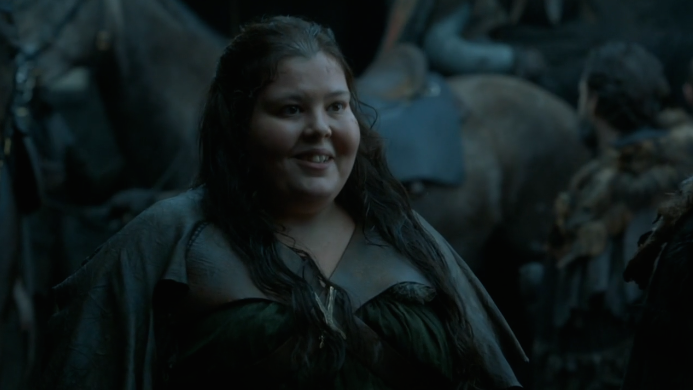
The Murder of Walda
While the death of Roose Bolton was another vicious chess move in the never-ending game of thrones, the execution of Walda Frey and her newborn son was personal. With dear ol' dad out of the way, Ramsay had to ensure that no one that shared his blood could live. No one who could challenge his authority could leave Winterfell alive. That meant Roose's widow and infant son had to go. And since this is Ramsay Bolton we're talking about, they had to go via vicious hunting dogs.
This isn't the first time this show has executed children before, but the (thankfully offscreen) deaths of Walda and her unnamed son rank among the show's most horrifying moments, a reminder that this show takes no prisoners and refuses to play nice. It's a troubling sequence and I understand how many viewers may see this as the series rubbing our noses in violence and utilizing shock for shock's sake. And yet, I feel that this is simply Game of Thrones playing by the rules it has previously established. For this to have gone every other way, the show would be forced to betray everything it has shown us about Ramsay Bolton. We could argue all day and night about whether this was a step too far for a series that giddily generates headlines and think pieces about whether or not it's taking things too far, but the fact remains that this kind of viciousness has been the bread-and-butter of the series since Ned Stark lost his head.
Disgusting and disturbing? Yeah. Out of bounds? On Game of Thrones, of course not.
The Assassination of Balon Greyjoy (and the Return of Euron)
And just like that, the fifth and final king from the War of the Five Kings has met his end. And just like that, the third leech burnt by Melisandre back in season three has finally paid off. Balon Greyjoy, the ruler of the Iron Islands and the father of Yara and Theon, is dead. And unlike the books, the show made it very, very clear who pushed him off that rope bridge to his death.
If there was one scene where "Home" stumbled, it was here. As a book reader, I was well aware of who Euron Greyjoy is and what he's all about. However, the newbies I watched the episode with were baffled. It doesn't help that Balon's crazy younger brother is yet another bearded guy with an inscrutable accent and that he's introduced at night in the middle of a fierce rainstorm. It also doesn't help that his introduction scene is an exposition dump that tries to let us know how crazy he is straight away. We hear the story of him cutting out the tongues of his ship's crew. He mocks the Drowned God and declares himself "the storm." That's all well and good, but it doesn't make Euron's first scene on the show any less muddy. His arrival feels like the return of a character we haven't seen in a few seasons rather than the introduction of a new character.
Still, I have faith in Euron, who is one of the book series' most enthralling (and totally crazy-pants) characters. The death of Balon is the most exciting thing to happen in the Iron Islands in quite some time and as indicated by the discussion between Yara and the drowned priest, a Kingsmoot is coming. But what is the Kingsmoot? Well, let's just say that it's how the followers of House Greyjoy select a new leader. Euron and Yara are already in play for that particular gig, but it should be noted that the miserable and scarred Theon is heading home at the moment. Things are going to get weird at Pyke.
Tyrion Unchains the Dragons
We didn't spend too much time in Meereen this week, but we did spend just enough time there to hear a new collection of eunuch jokes and for Tyrion to unchain the dragons Daenerys imprisoned a few years ago. You know, the little things.
The truth is that we've only spent enough time with Tyrion, Varys, and the rest of the Meereenese crew to know that their situation is totally screwed and that they need to start working overtime ASAP if they want to prevent the city from descending into further anarchy. Unchaining those dragons, and showing them that Daenerys' unlikely new ally is their friend, is a good start. It's a beautiful scene and Tyrion's awe at being so close to these magnificent creatures is palpable. His monologue, delivered to the darkness and two animals that can't understand him, is a thing of beauty and yet another feather in Peter Dinklage's increasingly crowded cap. For a person like Tyrion, a smart and wily man whose interest in books and legends is well-known, meeting a dragon is a life-changing moment. This is an incredible scene in an incredible episode.
And yet, the Meereen story seems to be the only storyline on Game of Thrones that is truly moving at a crawl at the moment. Now that those dragons are unchained, it's time to do something with them.
Arya Graduates "Blind Beggar" Class
Everything sucks for everyone on Game of Thrones, but things have been sucking more than usual for Arya Stark, who was blinded by her assassin school mentor and sent to live on the streets, where she was regularly assaulted by another trainee from the House of Black and White. As expected, this was just another part of her training, a special class in her journey to becoming "no one." After taking her fair share of lickings (her bruised and injured face suggests that the "Waif" has been visiting her for some time), Arya is reunited with Jaqen H'ghar, who offers her food and shelter and even her sight back if she'll tell him her name. She refuses. She passes the test. She enters the next stage of Daredevil training.
Like with Tyrion's storyline, Arya is inching forward at a snail's pace, but at least she has some direction. Her crisis is simple – she has to graduate assassin academy despite being blinded by the man who is training her. It's easy to see the end point here, with the youngest Stark girl learning to use her disability to her advantage and becoming the killing machine she's been destined to become ever since she ran a stableboy through with Needle so many seasons ago. The lingering question is, who wields Arya once she's been transformed into a weapon? Who ends up on the other side of her blade?
King Tommen Asks Mommy For Help
In a world filled with scumbags, King Tommen Baratheon has stood out as being a genuinely good person, a kid with a healthy head on his shoulders and a proper moral compass. He may be the result of incest between two awful people, but he's not his brother. He's kind. He's decent. He has a cat named Ser Pounce. However, he's so gentle that he didn't know how to react when his wife and mother were taken by the Faith Militant and sentenced to trial by the High Sparrow. The kid who has seemingly gotten through life by avoiding conflict at every opportunity had to watch as the two women central to his life were imprisoned and humiliated. He may be a kind king, but Tommen is not a strong king.
And that's why his big conversation with Cersei this week was so heartbreaking. If anyone can teach Tommen how to command respect and put down his enemies quickly and efficiently, it's his mother. However, if anyone can strip him of his morals, harden his soft edges, and transform him into the monster everyone expects him to be, it's his mother. King Tommen is between a rock and a hard place, in a position where the only way to preserve peace is to unsheathe the sword. His uncle/father knows this, having confronted the High Sparrow himself on his own turf. His mother knows this, having sent her bodyguard out into the city to take down any trash talkers with extreme prejudice. Tommen has defined himself by not being his mother or his father, by showcasing an empathy and inherent goodness not common to those with Lannister blood. By taking these aspects away from him, by making him just another Lannister, Cersei may be sealing the fate of her final child.
The Resurrection of Jon Snow
We all knew it was coming, but director Jeremy Podeswa milked it for all it was worth. Jon Snow is alive once more, resurrected by the magic of Melisandre, whose shaken faith has not prevented her from being able to call upon the powers of R'hllor. The Lord Commander of the Night's Watch once again draws breath...but who is he now? What is he?
This isn't the first time we met a man resurrected by the Lord of Light. Back in season three, the red priest Thoros of Myr aided the Brotherhood Without Banners by continuously bringing their leader, Beric Dondarrion, back from death. There were consequences, though. As he told Arya, each resurrection brought back a little less of him. Something was left behind. He was not whole anymore. This obviously weighed on him and troubled him. Will Jon Snow suffer these side effects?
However, there's something more important to note about all of this. Take a look at the Night's Watch oath, which every Brother in Black must recite when they join. It opens with: "Night gathers, and now my watch begins. It shall not end until my death." And you know what? Jon Snow did die. His heart stopped. He was no longer among the living. He fulfilled his oath. He found a loophole. If he wants to leave the Night's Watch with Davos and Melisandre and march an army of wildlings to the gates of Winterfell, no one can stop him. He no longer owes the Watch a damn thing. He owes the men who betrayed him nothing.
Spoiler Corner
Random speculation and book spoilers follow. Read at your own risk.

